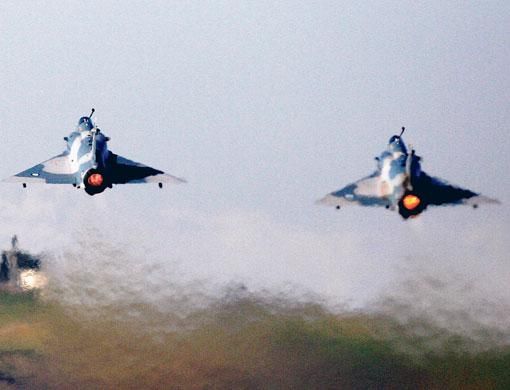Tanagra, Greece: Inside the bunkered briefing room, coloured pins mark Greek and Turkish air force bases on a large map of the Aegean Sea.
But outside, jets roar into the sky as Greek pilots intercept Turkish fighters in fiercely contested air space.
This air base is at the sharp end of a dispute burdened by wars, piles of international agreements and peace treaties, and unusual geography that has kept prospects of a solution between the two Nato allies remote.
Greece and Turkey remain at odds over air-and-sea boundaries and flight rules in the Aegean. So in an area best known for its holiday beach resorts, armed warplanes routinely carry out interceptions and mock dogfights.
"This is what we do every day," said 332 Squadron Commander Antonis Vassiliou, whose outfit uses French-built Mirage 2000 jets for interception missions out of Tanagra Air Force base, north of Athens.
"We intercept aircraft that violate flight rules," Vassiliou said. "We keep a distance that allows us to physically see the plane, so that our opponent is aware he's under surveillance. The aim is that he leaves the area as fast as possible."
He adds: "It's our way of life ... we remain prepared to address a situation that has built up over years and is likely to continue for many years." That worries politicians.
Greek Foreign Minister Dora Bakoyannis warned recently that Greek-Turkish relations are effectively at a standstill, after a decade of steady improvement.
The two countries came to the brink of war three times between 1974 and 1996 over the Aegean and war-divided Cyprus.
Greek officials say the number of violations has held constant at about 1,500 each year, but that Turkish pilots have adopted more aggressive patrolling tactics such as low-altitude flights over tiny populated islands. The increased aggression is troubling, Bakoyannis said.
The Aegean remains a source of contention.
Greece, whose easternmost islands shave Turkey's coastline, says there is no issue up for discussion except setting the limits for the continental shelf, allowing each country to mark out where it can exploit seabed oil and mineral deposits.
However, Turkey says Greece is hindering its access to international waters and air space in the Aegean.
Turkey maintains it is not carrying out any air space violations since it defines the area within Greece's control differently from Greek Authorities.
Athens claims an area in space that is equivalent to 10 nautical miles from earth, but Ankara recognizes the area equivalent to only six nautical miles, and Turkish jets frequently fly through the remaining area of four nautical miles. Turkey also does not submit flight plans to Greek civil aviation authorities when flying over the Aegean.
Turkish officials also maintain that sovereignty has yet to be determined over many small uninhabited islands near its shores - a claim that outrages Greece.













